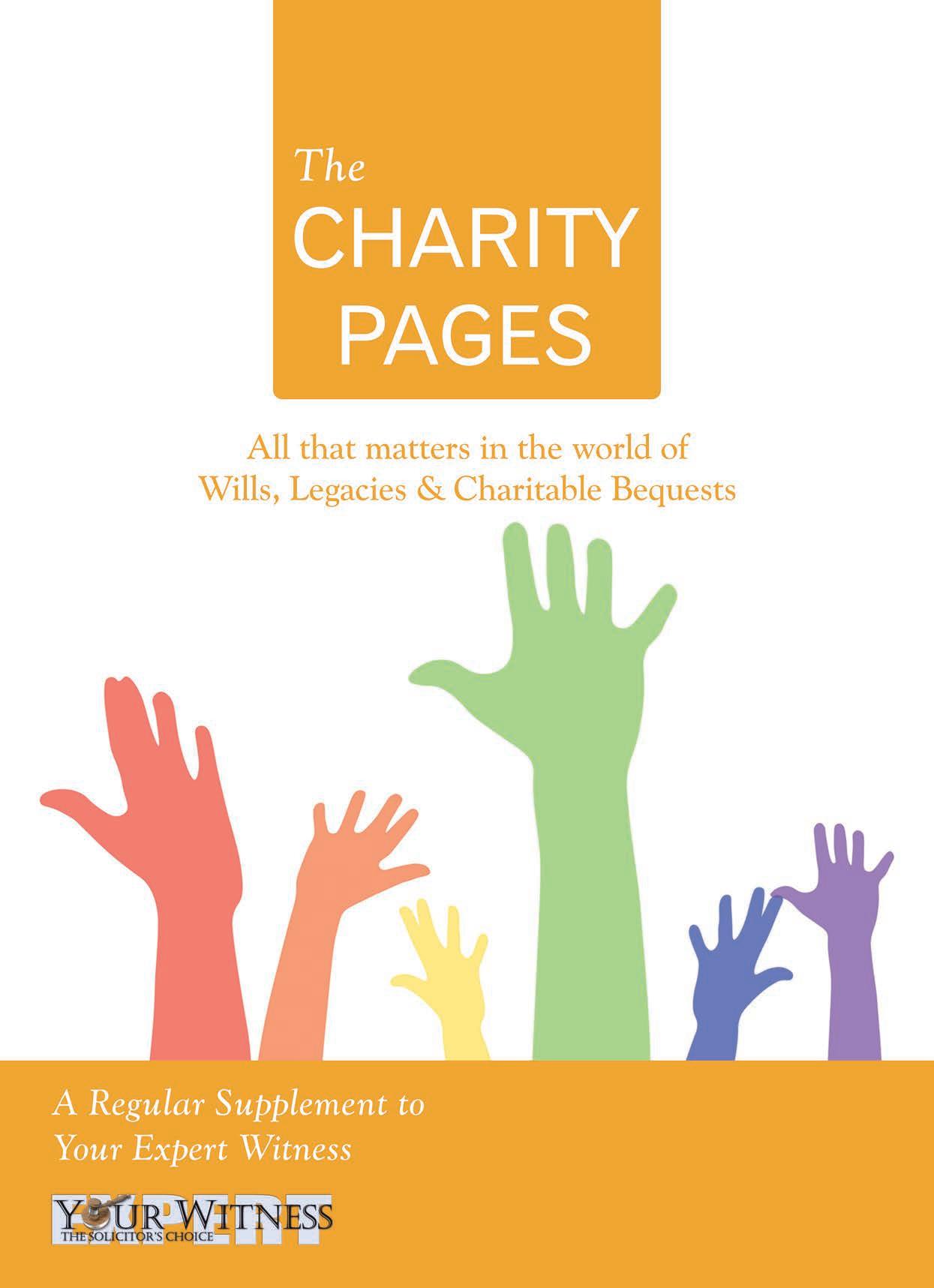


As we approach the mid-point of the year, it is possible to take stock with a little clarity of how the charities sector – and legacies in particular – performed in 2022. The picture is mixed, to say the least. Legacies managed to stay ahead of the curve in the face of the cost-of-living crisis, with records once more being set for both the number of legacies recorded and income. That latter was up 13% on the previous year.
• The ever-increasing number of legacies is due at least in part to the efforts of solicitors and other professional will writers. A large majority of professionals now raise the subject as a possibility to their clients, with the result that nearly a quarter of wills being professionally written now include a charitable bequest.


• Despite last year’s performance, there is a forecast of short-term decline in legacy income in the near future, before a return to the normality of growth. Even then, inflation is eroding what gains are made. A factor that is set to influence that trend is the number of Millennials and Generation X people making wills and including legacies in them. Charities need to adjust their message to fit the new medium.
• In the wider charitable market the picture is equally mixed. Two reports show what at first sight appear to be conflicting results. Legacy income is on the rise, it is true; but there are fewer of us donating and getting involved than before the pandemic. Whether that picture is set to persist remains to be seen.

• Recent crises of trust in the sector are being addressed across the UK with the Charities Act being implemented incrementally and its counterpart in Scotland progressing through the usual Parliamentary passage.
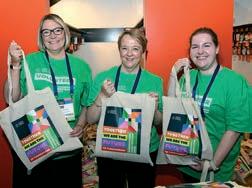

That doesn’t mean a few bad eggs will not persist, as an unprecedented inquiry by the Charity Commission has demonstrated. The Fundraising Regulator’s head of investigations explains the possible pitfalls of engaging third parties.
• Fortunately, the good continues to triumph, as demonstrated by two sets of awards presented in successive months. The Legacy Futures Bursary Awards 2023 followed hot on the heels of the inaugural Smee & Ford Legacy Giving Awards. We offer our congratulations to the winners of both.
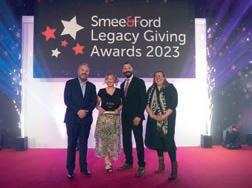
3 3 Charitable thoughts... CONTENTS 21 27 43 7 Smee & Ford reports a record-breaking year for charity legacy income 9 Forecaster expects short-term levelling off of legacy income 13 Annual legacy summit draws near 13 In-person masterclass examines potential in legacies 15 Nearly a quarter of wills written professionally include a legacy 15 Dates revealed for annual legacy promo week 21 Inaugural awards ceremony tops off legacy forum 21 Legacy Futures reveals its 2023 Bursary winners 27 Millennials and Gen X are important market for legacies 31 Charities Act: more provisions due in June 33 Scottish Charity Bill clears first hurdle 33 Regulator publishes latest data on Scottish charities 37 Fewer people participate in charitable activities, CAF finds 39 Major campaigners lead to rise in donations for 2022 43 Fundraising community looks forward to its big event 46 Repeated inquiries into charity prompts statements from regulators In this issue... In association with Your Expert Witness Suite 2, 61 Lower Hillgate, Stockport SK1 3AW Advertising: 0161 710 3880 Editorial: 0161 710 3881 Subscriptions: 0161 710 2240 E-mail: ian@dmmonline.co.uk 2YWVCP
Copyright Your Expert Witness. All rights reserved. No part of this publication may be copied, reproduced or transmitted in any form without prior permission of Your Expert Witness. Views expressed in this magazine are not necessarily those of the publisher. Printed in the UK by The Magazine Printing Company Plc www.magprint.co.uk

Every day we make good things happen, but we can only do it with your help
The photograph on the right of border collie Nipper was taken on the same day that he’d been taken to a vet’s to be put to sleep. Purchased as a ‘surprise’ gift, he was unwanted. The beautiful puppy was just eight weeks old and is just one of over 9,700 animals rescued by Friends of the Animals.
There was a happy ending as –now renamed Stanley – he was rehomed with one of the charity’s voluntary drivers, who adores him.
Friends of the Animals began in March 1990 and had very humble beginnings. Veterinary treatment is invariably the charity’s biggest outgoing and to date they have spayed or neutered 43,000 animals. Thousands more have been wormed and inoculated – often for the first time in their lives!

Founder Helen Sinclair MBE, who was honoured for Services to Animal Welfare in 2014, takes up the story: “There have been many memorable cases, where we’ve saved animals’ lives against all the odds. Animals such as the puppy who slipped under the railings of a balcony – luckily bouncing off the conservatory roof which broke her fall. Then there was the dog who fell down a manhole in the road after someone had removed the cover, and poor Marshall, who had three broken legs and a severed ear.
“Susie, a Labrador/Staffy cross (pictured above), was badly burnt in a house fire, but made a good recovery; and the dear little cat above had everything wrong with him, but survived and thrived.

“When 11 month old Border Collie ‘J.J.’ came into our care, she had a pin / plate poking through
a badly infected front leg, a paw so badly crushed the bones had fused together and a stab wound.
“Her original owner pleaded guilty to causing unnecessary suffering to a protected animal and was fined £2,000 and banned from keeping an animal for ten years.

“As you can see from the wonderful photo below, ‘J.J.’ went on to much better things.”
Gifts in wills fund almost one in two veterinary treatments and so legacies are an absolute lifeline to the rescue and spaying/neutering work carried out by Friends of the Animals.

The charity has a policy of non-destruction, unless an animal is sick or injured with no hope of recovery, and they keep admin costs to a minimum. Very importantly, 96% of their staff are volunteers, which ensures as much of your gift as possible is spent on saving animals.
Pitted against that constant battle to save animals was the action of the person who set fire to the front of the Charity's base.

“But, happily,” said Helen, “we're a resilient team and together with the help of supporters, we barely skipped a beat and just kept on going.
“We truly appreciate that people have many choices regarding charities to support, but no one appreciates it more, or tries harder than we do, to get the very best possible use from every penny donated. Thank you for your consideration.”
5 5
GIFTS PROVIDE A LIFELINE
Since its founding in 1883, Edinburgh Dog and Cat Home has relied almost entirely on gifts in wills to keep its doors open.

The home costs nearly £3m a year to run, and in the absence of any regular government funding, they are left almost completely dependent on donations and fundraising initiatives to keep going.
One of the most powerful ways that the community has supported the charity is by leaving gifts in their wills. An astounding one in three animals that reside with them each year has had their care funded by legacies.

Legacies and Individual Giving Manager Ella Wilson explained: “We simply couldn’t keep going without this lifeline and there really are no words to describe what it means to us when we discover that someone has made that decision to include us in their will.
“This support can transform the lives of the hundreds of vulnerable animals who need our help each year – for as long as they need it. By leaving a gift, your love and compassion for animals can live on.”
To find out how to make a lasting contribution, please visit edch.org.uk/legacies or contact Ella Wilson, Legacies and Individual Giving Manager on 0131 609 0621 or by emailing fundraising@edch.org.uk
LEGACIES – THE GIFT OF LIFE
ANIMAL CHARITY Wild Futures rescues and offers sanctuary to monkeys who have suffered abuse and neglect. They are dedicated to protecting primates and their habitats worldwide – primates are endangered due to climate change, habitat destruction and the bush-meat and pet trades.

For some species, it is too late. The future of all that remains lies in our hands, so leaving a legacy to Wild Futures is the gift of life and a future for primates and our wonderful planet.
Wild Futures’ holistic approach makes them unique – providing sanctuary to rescued
monkeys, supporting projects overseas, campaigning for primate welfare, educating to protect primates worldwide and promoting a sustainability and ethical ethos.
They receive no government funding, so the generosity of those that remember Wild Futures is essential to enable them to continue their work. A legacy can be the gift of a life worth living and a wild and safe future for all. q
• For more information call 01503 262532, email giving@wildfutures.org or visit the webiste at www.wildfutures.org

6 6 LEGACY
[
SMEE & FORD REPORTS A RECORD-BREAKING YEAR FOR CHARITY LEGACY INCOME
[THE LATEST Legacy Trends Report from Smee & Ford reveals that 2022 was a recordbreaking year for legacy income to charities in England and Wales. The legacy tracker identified 37,053 charitable estates out of a total of 269,699 estates processed in 2022 that included a will: meaning around 14% of probated estates with wills are charitable.

Organisations reporting legacy income to the Charity Commission, covering all financial year-ends between July 2021 and June 2022, increased to £3.3bn – a 13.2% increase on the previous year’s total of £2.9bn. Those organisations represent the largest legacy recipients in the country and recieve at least £500,000 in total annual income.
For charities who do not report legacy income with the Charity Commission –those with a total income of less than £500,000 – Smee & Ford’s calculations show that legacy income was worth £447m in 2022. That is significantly higher than in previous years, showing that more legacy income is being distributed to charities with lower total annual income.
Combining the figures, Smee & Ford estimate that total legacy income to charities increased to around £3.7bn in 2022. That is positive news for the charity sector, being the largest total they have ever recorded.
Understanding the value of estates
The value of charitable estates also saw a significant increase: from £19.9bn in 2021 to £21.3bn in 2022 – a 7% growth and the first time values have exceeded £20bn. Estate value growth is important to legacies, Smee & Ford explain, because growth in estate values translates to growth in the values of residual bequests. In recent years, they have seen growth in the average value of charitable estates, from £496,000 in 2017 to £576,000 in 2022. Over the past year the
average value of a charitable estate has increased by 8%.
As the report explains: “For most people, the most valuable asset when they die is the home they live in, which is why house prices are so important to the value of many legacy bequests. An examination of the House Price Index reveals that the average house price in November 2022 was £295,000, which is £28,000 higher than this time the previous year. This should have positive implications for residual bequests.”
Polly Avgherinos, managing director of Smee & Ford, commented: “It is encouraging to see total legacy income for charities reach a record high in 2022, as well as a new milestone reached for the value of charitable estates. We hope that legacies will remain resilient in the face of the current economic climate, and remain committed to supporting the sector with valuable market insight throughout this year and beyond.”
Other key findings in the Legacy Trends Report include:
• In 2022 there were 10,627 unique
• charitable organisations mentioned in
• wills: the second highest Smee & Ford
• have recorded over the past decade.
• 37.1% of charitable wills contained just
• one named charity and 21.7%
• contained two charities. The highest
• number of charities named in one will in
• 2022 was 79.
• There were 37,053 charitable estates in
• 2022, nearly the same number as
• reported the previous year.
Regional variations
The report also identified regional variations in the amount of giving in wills.
• Areas with the highest concentrations of
• charitable wills in 2022 include
• Brighton, Birmingham, Portsmouth,
• Bournemouth and Bristol; all having
• over 760 charitable estates.
• Areas with the lowest concentrations
• of charitable estates in 2022 include
• Llandrindod Wells, Halifax, Sunderland,
• Southall and Ilford; all having less than
• 120 charitable estates.
• Areas which have seen the most annual
• gains in charitable estates were Bristol,
• Leeds and Peterborough.
• Areas which saw the largest annual
• declines in charitable estates were
• Kingston upon Thames, Brighton and
• St Albans. q
CARING FOR CHELONIA
[ THE BRITISH CHELONIA GROUP publishes six newsletters a year containing details of meetings, short articles, news items and veterinary notes. Their journal Testudo is published annually and contains original articles and reviews on all aspects of turtles, terrapins and tortoises – their biology, conservation, welfare, veterinary care and husbandry. The group also organises symposia.
As well as the yearly appeals in aid of specific international causes in chelonia research and survival, the BCG assists other worthy causes in support of its aims with grants. They invite grant applications from organisations and individuals engaged on the work of chelonia conservation – such as zoos, universities, zoologists and students in this country and overseas. q

7 7
YOUR LEGACY – THEIR LIFELINE
ALFIE’S OWNER, Pam, had been diagnosed with a degenerative disorder which affected her ability to care for him. She was also trying to leave an abusive relationship but would not do so until she had secured a safe place for Alfie.

Oak Tree Animals’ Charity managed to safely remove Alfie and brought him to their sanctuary in Carlisle. This enabled Pam to move to a more suitable and safe home, and the charity arranged for Pam to see Alfie again before he went to his new home.
Alfie and Pam are just two of the thousands of animals and owners helped by Oak Tree Animals’ Charity each year. In 2022, Oak Tree hit a new record of 4,300 animals helped and, unfortunately, this number keeps rising every year.
Their ‘A Helping Paw’ service offers pet fostering to victims of domestic abuse and the homeless. The service is run by dedicated volunteer fosterers, and since 2019 they have helped over 60 pets and 40 families. Without generous gifts in wills, the vital work to help animals and owners, like Alfie and Pam, in these devastating situations just wouldn't be possible.
Oak Tree Animals’ Charity and its wonderful supporters have been helping animals since 1909. One supporter who chose to leave a legacy to Oak Tree explained her decision: “I wish more people would support animal charities like Oak Tree and be part of their incredible work. I want to help Oak Tree Animals’ Charity continue its wonderful work for many years to come. It is comforting knowing that I will still be able to support animals long after I am gone.”
More than half of the work at Oak Tree is funded by legacies – including veterinary treatment, food, bedding, heating, enrichment, water and general maintenance, plus so much more. Every donation received means they can open their doors for another day, providing a lifeline to animals across their region. q
• If you would like to find out more about leaving a legacy, please email legacy@oaktreeanimals.org.uk or visit www.oaktreeanimals.org.uk/get-involved/ ways-to-donate/your-legacy.html

8 8
[
FORECASTER EXPECTS SHORT-TERM LEVELLING OFF OF LEGACY INCOME
[LOOKING TO THE FUTURE, the Legacy Market Outlook 2023-2027 from Legacy Foresight – part of the Legacy Futures group – predicts that average annual income from charitable bequests will remain stable at around £3.9bn for the next few years before returning to growth.
The report factors in current legacy trends, projected number of deaths and the most likely economic conditions, together with estate administration issues, to predict the number and value of future charitable bequests.
Announcing the publication of the report, Legacy Foresight said: “This latest forecast estimates that UK legacy income reached a record £3.85bn in 2022, buoyed by a strong bounce back after the COVID-related impacts on the probate system. Looking ahead, we forecast legacy income to remain resilient over the coming years, maintaining at around this level despite ongoing economic challenges.
“It shows that a subdued economic environment, driven by an expected drop in house prices and share price volatility, is likely to drive reductions in the average value of residual gifts over the next couple of
years, which will limit growth.
“However, the expansion of probate staff numbers at HMCTS, combined with the longterm upwards trend in the number of deaths, is likely to boost bequest numbers to around 145,000 per year over the next five years. As a result, these two factors will balance against each other to result in annual legacy income remaining relatively stable for the next few years.”
Economist Jon Franklin explained: “Despite the economic headwinds it is unlikely that legacy income will fall dramatically in coming years. The long-term upward trend in the number of deaths will lead to increases in the number of gifts, which will largely offset the impact of anticipated falls in house prices.“
Ashley Rowthorn, group CEO of Legacy Futures, added: “While the forecast remains promising, this is not a time for complacency. The charity legacy market is becoming increasingly competitive with more organisations entering this space and, despite the volume of legacies increasing, the average gift value is likely to decrease, at least in the short term. Charities will need to understand
market conditions, how these are affecting their supporters and be relevant in their fundraising to secure legacy income for the future.“
The ageing population means deaths are expected to continue rising on a long-term upward trend over the next five years, the report says.
In its pessimistic scenario Legacy Foresight highlights the risk that legacy income could fall by around 5% over the next couple of years; however, it does not anticipate significant declines. That means legacies should remain a relatively resilient source of income for charities during what is likely to be a challenging period for fundraising.
Commenting on the findings, Lucinda Frostick of Remember A Charity said:
“This forecast conveys the resilience of the legacy market, providing stability for charities and significant income even in the toughest of times.
“Appetite for legacy giving remains high and, even for those who are tightening their purse strings, it’s proving to be an increasingly attractive option to make a sizeable impact without immediate financial outlay.” q
GIVING HOMELESS AND UNWANTED DONKEYS A FOREVER HOME
[ THE Isle of Wight Donkey Sanctuary is unique – and their donkeys are special. The charity rescues donkeys who need a home, and they look after their health and welfare at the sanctuary. In doing so, they are not only helping the donkeys, but supporting their work with people for whom they bring joy, comfort and happiness.

According to the charity’s Jon Lavers: “Rescuing and caring for our donkeys does cost money. A bale of hay can cost £5, a farrier treatment £30 and an operation can cost several thousand pounds. We are a voluntary organisation and we have to raise all the money that our donkeys need through our own fundraising.”
Thanks to kind and generous support, the charity are currently providing a safe home for over 100 donkeys, some of whom simply would not be with us today if it wasn’t for such donations – like Blakey, who was abandoned in a field with no help, or Phantom who lost his mum when he was just six months old.
Jon continued: “To fund our work, we rely heavily on the kindness people show in leaving a gift in their will. This is something that is difficult to talk about but is vital to our work. Without your generous donations, we simply wouldn’t exist.
“Gifts from legacies have helped us protect the donkeys from rain and sun, fund our donkey therapy programmes for people with specific needs and help our animals work with special school youngsters.
“If you feel that a donation to a worthy charity is the way a loved one should be remembered, we will thank you for your consideration, on behalf of our donkeys.
“A gift in a will is powerful. It transforms the lives of our donkeys and celebrates the life of a loved one.” q
9 9

FROM A WORLD WITH MS TO A FUTURE FREE FROM ITS EFFECTS …YOUR WILL COULD TAKE US THERE
[ THERE ARE OVER 130,000 people living with multiple sclerosis (MS) in the UK today; and nearly 7,000 newly-diagnosed cases each year.
Life with MS can be tough. It’s unpredictable and different for everyone. It’s often painful, exhausting and can cause problems for people in how they walk, move, see, think and feel. But thanks to support from kind people who donate to the MS Society, research into the disease has made huge leaps forward.
Nick Moberly, CEO of the MS Society, commented: “We still have a long way to go, but today there’s so much more we can do to treat symptoms, manage progression and ease anxiety.

“Right now we’re funding over 40 projects to help improve diagnosis and treatments. And our scientists are making some tremendous breakthroughs. There are groundbreaking discoveries and new knowledge on potential ways to repair myelin and protect nerves; and there are new projects and clinical trials underway. So there’s real momentum and hope on the horizon.
“We’re investing in research to help find treatments that could stop and, maybe one day, reverse the progression of MS. We can’t stop now. Our goal of stopping MS really is within reach. Now, with a gift in your will, you can help make it a reality for the next generation.”

Raphael lives in London with his wife Lucy. They have a four-year-old daughter, Tali, and one-year-old son Asa. Raphael has lived with MS for many years and says the treatment he takes makes a huge difference. It helps him get on with his life with less disruption.

“I want to continue being a supportive father and role model to my kids, and husband to my wife,” he said. “To me, stopping MS would mean certainty over a large part of mine and my family’s future. It would take a huge weight off my mind.”
Nick Moberly continued: “If you’d like to be part of a community of people bringing us closer to stopping MS – whether that’s through providing information and support, continuing to fight for access to new drugs, or supporting vital future research – please think about including a gift to the MS Society when you next make or update your will.
“We understand that protecting the financial future of those you love is your main priority when writing a will. But over 40% of our income comes from those who’ve also included a legacy gift to the MS Society, and no matter the size, it’s thanks to support from people leaving these special gifts, that we’re getting closer to stopping MS and making sure generations to come can live in a future free from its effects.
“With your support, the future is bright for people living with MS. Let’s finish the work we’ve started and stop MS together.” q
• For more information related to gifts in wills and the services the MS Society offers, call 020 8827 0374, email legacies@mssociety.org.uk or visit legacies@mssociety.org.uk/gifts-in-wills
11 11
“
I am so grateful to people who help fuel research into stopping this life-changing illness.
”
Raphael, London (pictured above with his family)
PRACTICAL SUPPORT HELPS TO ALLEVIATE THE IMPACT OF SIGHT LOSS
[THERE ARE TWO MILLION people in the UK living with sight loss and by 2050 the figure is set to double. Being diagnosed with any form of sight loss is lifechanging and devastating for both the individuals concerned and their families.
The Partially Sighted Society is a national charity that understands this; it has been providing help and support to anybody living with sight loss for over 50 years.


The society’s range of services includes the design, printing and provision of bespoke school exercise books for children, a specialist low-vision and sight test service, and the provision of aids and equipment to assist those living with sight loss to continue to live full and independent lives.
They are there to offer support for both the practical and the emotional impact of sight loss, by phone and in person. They also offer a range of social and support activities to alleviate the social isolation that comes with sight loss.
Leaving a gift in a will is a meaningful way of helping The Partially Sighted Society to help others. Legacies leave a lasting impact on transforming the lives of those living with sight loss. q
UNTIL CLEFTS ARE PREVENTABLE, HELP IS AVAILABLE WORLDWIDE
[TODAY, ONE IN 700 BABIES in the UK are born with a cleft lip and palate, the most common form of birth defect.
The impact on a child’s life as they grow is profound. It may affect not only the way they look, but also their speech, hearing and dental development. And it can leave deep psychological scars.
In the developing world, patients with clefts are frequently not operated on until later in life, if at all. As a result, they may be malnourished and unable to talk well or hear properly. Often, they will be social outcasts.
At CLEFT, our vision is of a future where clefts are preventable. Until we get there, we want to improve the lives of those born with cleft lip and palate – in the UK and in poorer countries around the world.
Join the research effort
By funding research, we continue to make headway into understanding why clefts occur and to deliver pioneering new treatments that deliver kinder, more effective and more efficient care for children with cleft lip and palate.

By supporting the development of cleft centres in low and middleincome countries we aim to give children born with clefts in these poorer countries the same opportunities available to children in the UK. Each donation takes us a step closer to reaching our goal. All gifts could have a direct impact on changing the lives of many hundreds of thousands of babies and children around the world.
Please join us and help us prevent clefts for future generations. q

12 12
ANNUAL LEGACY SUMMIT DRAWS NEAR
IN-PERSON MASTERCLASS EXAMINES POTENTIAL IN LEGACIES
[THE CORAM CAMPUS near Russell Square tube station in London will see an in-person event from Legacy Futures on 22 June.
The Legacy Futures Masterclass will take a deep dive into how legacy professionals can go about increasing the value of the legacy gifts their organisations receive.
[ON 20 JUNE the Legacy Strategy Summit 2023 will bring together a talented and diverse community of experienced legacy fundraising professionals and their colleagues from UK and international charities, alongside industry experts.

With content specifically researched to provide learning, debate and insight for all delegates, regardless of charity size or legacy income total, the virtual summit day will provide those attending with valuable, first-hand insight into the latest trends in legacy giving and the latest news on legacy fundraising.
The keynote speech of the morning session will be delivered by legacy fundraising expert Richard Radcliffe. Caution: Not all causal areas are the same! will explain why legacy teams should be wary of copy-cat campaigns.
Other topics include:
• Harnessing new website engagement techniques and digital stewardship to
• improve results and increase interactions
• Effectively utilising the connection between donor identity and legacy giving
• and becoming more than just a campaign
• Is there a perfect time to invest in a bold new legacy campaign?
• Can AI technology produce effective and compassionate messaging?
One of the highlights will be a case study from a long-established and highprofile international charity which is restarting its legacy campaign after a five-year gap. The session will highlight how they have changed with their strategy, and how they are reconnecting with their donors.
According to organisers Smee & Ford: “With sessions for all levels of the team and all sizes of charity, from those new to legacy fundraising to experienced legacy team members looking for inspiration and insight, and senior leaders and board members wanting more insight into the income and donor engagement opportunities that can be created from legacy fundraising, the summit is designed to appeal to all charities across the legacy sector.”
The digital format will once again enable charities and speakers from charities outside the UK to view and participate in the summit – and their contribution to the day will be warmly welcomed.
Tickets are available via legacystrategysummit.com and include:
• Access to all the live content on the day
• Post-event recordings of all sessions
• Six bonus on-demand presentations for pre or post-event learning
Registration is now open. q
Announcing the event, the organisers said: “Many charities find that, ultimately, their legacy income is dependent on a small number of large gifts. While all gifts in wills are much appreciated, imagine the potential impact our organisations could have if we brought in just a few more of these large gifts or increased the average value of all gifts by a small percentage? Despite this potential, much of the focus of legacy fundraising in recent years has been on growing the volume of gifts, potentially at the expense of value: from bringing in new supporters via free will schemes to stressing the importance of small gifts.”
Hosted by Ashley Rowthorn, the masterclass will be led by Professor Russell James, Dr Claire Routley and Kath Horsley.
Russell James JD PhD CFP is a chaired professor in the Department of Personal Financial Planning at Texas Tech University, where he directs the on-campus and online graduate programme in Charitable Financial Planning.
Dr Claire Routley has worked in fundraising for over 15 years, specialising in legacy fundraising for the past decade. In 2011 she completed a PhD looking at why people choose to leave legacies to charity. She has worked for Bible Society, Age UK, WRVS and a local hospice, and teaches the Chartered Institute of Fundraising’s qualification courses.
She is now Head of Gifts in Wills Consultancy at Legacy Futures alongside a part-time position as a Post-Doctoral Research Associate at the University of Kent’s Centre for Philanthropy.
Kathryn Horsley is Director of Insight at Legacy Futures. She has been working in the legacy sector for over five years, prior to which she was a management consultant for brand strategy and design firm Lippincott, and previously Mercer Management Consulting.
Ashley Rowthorn is CEO of Legacy Futures. He has spent the past 15 years immersed in legacy giving. He started in a regional role, having legacy conversations in the community, and went on to manage legacy marketing campaigns at a leading national health charity. q
SAVING LIVES ONE SNIFF AT A TIME
[HYPO HOUNDS provide a viable health care alternative for children and their families by training a Diabetic Alert Dog to detect the subtle changes in the child’s blood sugar levels.

The dogs are trained to alert parents when the child’s sugar levels drop dangerously low or rise too high. This not only impacts on the child but also on the family’s ability to function as a unit, with the registered carer becoming the dog.
Hypo Hounds work is becoming nationally recognised and is literally saving the lives of children – one sniff at a time. q

13 13
HELPING THE FORGOTTEN PEOPLE OF ZIMBABWE
[ ZANE: ZIMBABWE A NATIONAL EMERGENCY is a UK registered charity working to help the most destitute, vulnerable and impoverished people in Zimbabwe. It is the largest supplier of financial aid to elderly people in Zimbabwe who lost their life savings and pensions in the economic collapse and subsequent hyper-inflation.

This includes over 500 frail veterans and their widows who fought for the Crown. ZANE assists with rent, medical bills and food – and, crucially, also provides comfort, advice and support.
In addition, ZANE funds a clubfoot correction programme, successfully treating over 5,400 children to date. ZANE also funds education programmes including the provision of pop-up classrooms in a high-density township for children who would otherwise not receive an education. It runs creative therapy workshops for women living in extreme poverty who are victims of political violence and trauma.

Zimbabwe remains a country in crisis. With some of the highest inflation and unemployment rates in the world, Zimbabwe’s economy teeters on the brink of collapse. Coupled with a woefully inadequate healthcare system, the need for ZANE is greater than ever for the most destitute people in Zimbabwe. q
• To find out more about the work of ZANE visit www.zane.uk.com

14 14
NEARLY A QUARTER OF WILLS WRITTEN PROFESSIONALLY INCLUDE A LEGACY
[THE LATEST SURVEY of the will-writing sector carried out by research firm Savanta for Remember A Charity shows that solicitors and professional willwriters are playing an increasingly important role in legacy giving.
Almost three-quarters (73%) always or sometimes raise the option of leaving charitable bequests in wills to their clients. Over a third (36%) say they always raise the option of a charitable legacy with relevant clients, while less than one in 10 (9%) say they never do so. Of those who don’t always raise the issue, more than one quarter (26%) say the most prominent reason is because they do not want to influence their client’s decision.
As a result, now almost a quarter (24%) of wills handled by UK legal advisers include a donation to charity, showing steady growth and long-term change over the past decade – up from 16% in 2014, as the graph shows.
Remember A Charity’s director Lucinda Frostick said: “When it comes to growing legacy giving, engagement and support from across the will-writing community is crucial. This benchmarking study charts a continual rise in the proportion of wills made through solicitors and willwriters that include a charitable gift and that’s so important for charities that rely on legacy income. These donations may not arrive for some years yet, but they will fund vital services and charities’ core costs for generations to follow.”
When asked about the most common barriers to legacy giving for clients, solicitors and will-writers believe the most common reasons are
DATES REVEALED FOR ANNUAL LEGACY PROMO WEEK
that they want to leave their full estate to their family (83%), that they have difficulty choosing which charity or charities to support (38%) or that it may cause or lead to a dispute (38%).
Three quarters of the firms in this survey (77%) have acted or assisted in the administration of estates that include a legacy to charity. Over half (56%) of those said they found charities easy to deal with. Only 13% indicated said they didn’t find charities easy to work with, with the top cited reason (22%) for that being that they communicate too often. q
[ THIS YEAR’S Remember A Charity Week will run from 11-17 September with promotion through the campaign’s partners, including its network of over 800 solicitors and will-writers.

Remember A Charity director Lucinda Frostick commented: “The more charities that come together and use this opportunity to shine a light on the importance of legacies for good causes, the more noise we can make and the more we can get people thinking about leaving a gift in their will.”
Member charities will be able to create promotional assets with their own messaging, imagery and branding up until 14 July.
Lucinda Frostick continued: “Giving charities their own personalised assets means they can start their own legacy conversations with supporters throughout the year. This dialogue can be crucial, not only in building awareness around gifts in wills, but in helping to break down some of the myths around gift size and flexibility, and inspiring supporters to take action.” q

15 15
Average proportion of wills which include charitable bequests (%) (%) 16 17 17 18 19 20 22 24 2014 2015 2016 2017 2018 2019 2021 2022

GIVING HOPE TO THE ONE IN SIX
[ONE IN SIX PEOPLE in the UK has a neurological disorder: that amounts to 16.5 million mothers, fathers, sons, daughters, friends and colleagues. Improving the outcome and quality of the lives of those affected is the driving force behind The National Brain Appeal, which funds pioneering research and provides access to the very latest technology for clinicians and researchers working in this field.
The charity dedicated to raising funds to advance treatments and research at the National Hospital for Neurology & Neurosurgery and the Institute of Neurology – together known as Queen Square – is The National Brain Appeal.
The driving force behind the charity’s work is the aim to improve the outcome and quality of life for everyone affected by a neurological condition. They include brain tumours, stroke, epilepsy, dementias, MS, motor neurone disease and Parkinson’s disease: all of which have no cure as yet. They look to achieve that vision by funding state-of-the-art equipment, major building programmes and life-saving research – over and above what the NHS can provide.
Legacies represent up to one quarter of The National Brain Appeal’s annual income. “They are crucial to the fundraising work we do,” said chief executive Theresa Dauncey (right). “We’re extremely grateful for every legacy left to us. Leaving just 1% of your estate can make a very real difference and is an investment in the future. The more money we receive, the more support we can give to the National Hospital, which in turn improves the prospects for those affected by neurological disorders.”
Penelope pictured (below) was diagnosed with multifocal motor neuropathy (MMN) in 2004 at the National Hospital for Neurology & Neurosurgery and attends a day care clinic run by a team of specialist nurses.

“My own personal journey with MMN makes me want to give back in whatever way I can,” she said. “That is why I have left a gift in my will to The National Brain Appeal. I want to help to fund crucial research into all neurological conditions going forward.”
Meta Wells-Thorpe (above right) is a former National Hospital patient. She had successful surgery for a benign brain tumour there in 1988. Since then both her
husband and sister have died of neurological conditions.
She explained: “My husband had Parkinson’s and my sister had multiple sclerosis – these are cruel diseases for which there is no cure and little hope.”

With that in mind Meta has made The National Brain Appeal a major beneficiary in her will. “The lack of a cure for so many debilitating neurological conditions is a strong motivator for me to want to help,” she continued, “and by leaving a legacy I can be part of something that will provide hope for others.”
You choose
Now more than ever, benefactors to The National Brain Appeal can control where they would like their money to go. There are six specific funding areas for which individuals can make a legacy pledge:
• Neurology: funding initiatives to improve diagnosis and treatment, and

• provide facilities for those with on-going neurological conditions
• Neurodegeneration: supporting projects which help people with


• conditions where there is progressive degeneration
• Neurosurgery: providing state-of-the-art equipment and facilities for the

• UK’s largest neurosurgery unit
• Technology and innovation: supporting projects which translate
• groundbreaking ideas into better results for patients
• Education and staff development: investment to provide the best
• opportunities and attract the best people in the field
• Queen Square: new facilities and staff-led projects at the National

• Hospital and the Institute of Neurology
For those who do not specify a funding area, their gift can be put towards an area with the most urgent need. q


Without the generosity and foresight of those who leave a legacy, we simply could not support the number of vital projects that we are currently able to.
• For more information about legacies and the National Brain Appeal, contact info@nationalbrainappeal.org or view the legacy section of the website at nationalbrainappeal.org/legacy

17 17
PROMOTING ANIMAL WELFARE BEYOND THE FARM GATE

[GROWING NUMBERS of us are concerned about the welfare of animals that provide us with food. While many people recognise the importance of a good life on the farm, animals may also face welfare challenges ‘beyond the farm gate’.
The Humane Slaughter Association (HSA) plays a vital role in promoting the welfare of animals in markets, during transport and at slaughter, by providing funding and support for essential research.

Protecting crab and lobster welfare
At present, crustaceans (crabs and lobsters) are often killed by boiling or carving without first rendering them unconscious or ‘stunning’ them. Some electrical stunning devices are available, but they have not yet been thoroughly validated. For other animals such as octopus and squid (cephalopods), the situation is even more dire with no routine stunning methods available.
The UK recently recognised that these species are sentient – in other words they are capable of both negative and positive experiences. Therefore, it is vital that we protect their welfare and minimise suffering. To achieve this, the HSA has provided funding to support two research projects which aim to identify and scientifically validate humane stunning methods for these species.
The pig issue
In collaboration with Defra (the UK Government agriculture department) the charity recently funded a project to develop a more humane method for stunning pigs in commercial abattoirs. High concentrations of carbon dioxide are commonly used for stunning pigs at slaughter, but there has
been
some
concern that this can cause pain and distress.
An alternative method – Low Atmospheric Pressure Stunning (LAPS) –was proposed to be more humane, but the research found that LAPS is unlikely to be a humane alternative to carbon dioxide. Whilst disappointing, this provides crucial evidence to protect the welfare of pigs at slaughter and to shift the focus of future research to find other potential improvements.
Practical and international
The HSA is dedicated to bringing practical and lasting improvements to the welfare of food animals around the world. They work with the livestock industry and animal welfare scientists globally to deliver training and advice on the welfare of animals during transport and at slaughter. They are currently working with colleagues in China, the largest consumer of meat in the world, to deliver training and advice to undergraduate students and those currently working with food animals, to improve the welfare of millions more animals.
The HSA is funded solely by donations and legacies from members and supporters. With your help, they can continue to make practical and lasting improvements to the welfare of all food animals. q
18 18
A SCIENTIFIC APPROACH TO ANIMAL WELFARE
[ MOST OF US care deeply about animal welfare and want to do the right thing for animals, be it those we eat, those we experiment upon, or our much-loved pets. But simply caring about animals isn’t enough; to guarantee their welfare we also need to know what makes animals’ lives better or worse.
At the Universities Federation for Animal Welfare (UFAW) their vision is a world where the welfare of every animal affected by humans is maximised through a scientific understanding of their needs and how to meet them.

They strive to answer such fundamental scientific questions about animal welfare through funding innovative research as in the examples below.
Welfare impacts of rat control methods
Every year, it is estimated that millions of rats and mice are killed as ‘pests’ in the UK alone. Despite the large number of animals affected, until now very little information has been available on the welfare impacts of common control methods being used in the UK.
A study, co-funded by UFAW, found that glue traps and chemical rodenticides were amongst the worst methods of rodent control in terms of animal welfare impact. The research findings provided vital evidence at an opportune moment as the Glue Traps (Offences) Bill was being debated in parliament. Subsequently the Bill has been passed and glue traps will be banned for public use in England.
Comfortable environments for laboratory mice

Traditionally, laboratory mice have been kept in barren cages and are housed at about 21ºC – but they actually prefer to be much warmer. UFAW-funded research showed that rather than turning up the temperature, the best way to allow mice to keep warm and enliven their environment was to provide materials like shredded paper so they could build a nest. This provided enrichment and allowed them to regulate their temperature just as they would in the wild. The work has improved the lives of millions of mice who are now routinely given nesting material. These and other projects also provide invaluable PhD training for researchers around the world, demonstrating UFAW’s commitment to developing the next generation of animal welfare scientists. The charity is also passionate about spreading the animal welfare science message. For instance, many breeds of companion animals suffer inherited conditions. UFAW compiled a database of these issues which is invaluable to professionals and pet owners alike in understanding which conditions affect which breeds – visit the website at www.ufaw.org.uk/genetics
UFAW is funded solely by donations and legacies from members and supporters. You can support science in the service of animal welfare by donating to support their work or leaving a gift in your will.
19 19
q
© Brianna Gaskill
CHARITY CAMPAIGNS AGAINST ENVIRONMENTAL ABUSE
[INVESTIGATING AND CAMPAIGNING against environmental crime and abuse is the 35-year struggle of charity Environmental Investigation Agency UK.

Its undercover investigations expose transnational wildlife crime – with a focus on elephants, pangolins and tigers – and forest crimes such as illegal logging and deforestation for cash crops such as palm oil. The charity works to safeguard global marine ecosystems by addressing the threats posed by plastic pollution, by catch and commercial exploitation of whales, dolphins and porpoises.

More generally, they help to reduce the impact of climate change by campaigning to eliminate powerful refrigerant greenhouse gases, exposing related illicit trade and improving energy efficiency in the coolant sector.
The findings of their investigations are used in hard-hitting reports to campaign for improved governance and more effective law enforcement – such as its latest Running Out of Time report, which examines the fast-growing role of Vietnam as a hub for illegal wildlife trade and the country's failure to respond to the crisis.
Their field experience is used to provide guidance to enforcement agencies and they form partnerships with local groups and activists to support their work through hands-on training.
The scale of the problems they face can be disheartening and the truths they uncover can be shocking. Their programmes of work build on decades of campaign successes and nail-biting undercover investigations by a small group of tenacious activists, from documenting
the slaughter of pilot whales in the Faroe Islands, to securing a global ivory trade ban at CITES, contributing to the Montreal Protocol on climate change and the adoption of the EU Timber Regulation to protect forests. A gift to EIA in your will is an investment in wildlife and habitat conservation. They have already achieved so much, with your help they will continue to keep the pressure on for generations to come. q
• For further information tel 0207 354 7960 or visit the website at eia-international.org


20 20
INAUGURAL AWARDS CEREMONY TOPS OFF LEGACY FORUM
APRIL SAW THE FIRST of two major awards ceremonies in the legacy sector. A total of 13 winners of the inaugural Smee & Ford Legacy Giving Awards 2023 were announced at a ceremony at Hilton, London Bankside, hosted by comedian Hal Cruttenden.

The award-winning entries were reviewed and assessed by an expert judging panel that included some of the biggest names from the charitable legacies community. Winners were scored based on judging criteria of Excellence, Innovation and Impact.
Polly Avgherinos, managing director of Smee & Ford, commented: “The purpose of the Smee & Ford Legacy Giving Awards is to recognise and celebrate the outstanding achievements of the people and teams working hard to attract, steward and manage legacy gifts for UK charities. The unique work of legacy teams has not always been widely understood and
appreciated, so we’re delighted that the winners have been recognised in an exceptional field of nominees, each showcasing successes and achievements this last year.”

While the lunchtime awards ceremony was a key focus of the day, these awards are more than just a celebration. The Legacy Giving Excellence Forum took place on the morning of the 27 April ahead of the awards lunch and discussed highlevel thought leadership to inspire legacy teams. The forum was an opportunity for those attending to join 200 shortlisted finalists and judges to examine the factors and techniques that are driving excellence, innovation and impact across the legacy sector.
For those who couldn’t join the in-person Legacy Giving Excellence Forum, recordings from all three panels have been made available to all those who attended the awards. q
LEGACY FUTURES REVEALS ITS 2023 BURSARY WINNERS
[MAY SAW THE ANNOUNCEMENT of the winners of the Legacy Futures Bursary Awards 2023. The organisers, Legacy Futures, received a record number of applications this year, posing a difficult task for the independent panel of judges to narrowed them down to six worthy winners.
The winner of the International Award, which supports organisations outside the UK who want to grow through legacy giving, was Will Power – the Canadian legacy giving campaign. The judges of the International Award – Tracey King of Deakin University and Elly Lont of LegacyGiving.eu – were impressed with the level of research and innovation already happening in the campaign, in particular how they are reaching out across generations and encouraging a wider group of people to consider leaving a gift to a Canadian charity in their will.
Will Power’s director Laurie Fox commented: “I was thrilled to find out Will Power had won Legacy Future’s International bursary! We’re at a stage in this national campaign where it’s time to take things to the next level and inspire even more charitable gifts in wills in Canada. Winning a mentorship from some of the world’s leaders in legacy thinking could not have been better timing.”
The Future Leader Bursary winners were Laura Wilkinson of Blind Veterans UK, Kim Greed of Blood Cancer UK and Catherine House of The Queen’s College, Oxford University.
The judges – Abbie Barton of Marie Curie (a 2022 winner) and Lucinda Frostick, director of Remember A Charity – felt that each of these future leaders demonstrated exceptional fundraising abilities and strategic thinking and that they would benefit and grow from the sixmonth mentorship offered to award winners.
The Crispin Ellison Bursary, named after the first director of the Institute of Legacy Management, aims to further professional development in legacy administration. There were two winners of the Crispin Ellison Bursary this year: Arian Thornton of Marie Curie and Laura Simpson-Toyn of Bransby Horses. Each will receive training from the Institute of Legacy Management (ILM) to the value of £1,000.
The judges – Emma Newell of Claire House Children’s Hospice (a 2022 winner) and Matthew Lagden, director of the ILM – felt that each of these future leaders demonstrated a breadth of skills, talent and passion that will serve them well as they develop their careers as legacy professionals.
The awards were founded as part of Legacy Futures’ mission to do all they can to support the sector and its fundraisers. The organisers
expressed their thanks to every person and organisation who took the time to enter and share their great work – and, of course, the panel of judges for their commitment to the awards.
“Huge congratulations to the winners! We’re excited to see what comes next in their gifts in wills and in-memory fundraising.” q
21 21
[

CARERS NEED SOME TLC, TOO

JOANNA LUMLEY, Patron of The Respite Association (TRA), recently paid this tribute to carers: “Carers are my heroes: caring 24/7, week-in and week-out, often for years on end, with no breaks or holidays and no complaints.”

Across the country there are thousands of unpaid carers; and since its formation in 2001 TRA has been supporting them to get a desperately needed break.
John Turner, one of the charity’s two part-time staff, explained: “It doesn’t take a great deal to have an enormous impact on the lives of carers. They don’t see what they are doing as a burden because they are caring for someone that they love; but they just need a little rest.”
“One lady, whose son is on the autistic spectrum, explained that he only sleeps for two hours per night, so that is all the sleep she gets, too. That lady just wanted a normal night’s sleep to catch up – while a gentleman in his seventies, caring for his wife who has dementia, wanted a weekend so he could go to his granddaughter’s first piano recital.”
TRA also have two holiday facilities – in Cornwall and Wales – where they give carers a week-long break by the seaside. A carer who had a break in the charity’s caravan at Rhyl wrote: “We had the most
amazing time on holiday – gutted to be home in fact. Whilst I was there I couldn't help thinking of you and what an amazing opportunity you gave us. Me and my family are extremely grateful and always will be.
“The caravan was filled with lots of board games and books for both adults and children and we loved it. I usually don’t have time to read with my children or sit and do a jigsaw with them, but on holiday I did – everyday. And instead of dishing out medication of an evening I spent that time in the park with my family.
“It was so good to just be out in the fresh air and actually taking in the sky! You allowed me to have uninterrupted quality time with my children and for that I’m truly thankful.”
John explained “TRA offers something that you and I take for granted: a little bit of normality; enough to recharge the batteries and carry on caring. We have been incredibly fortunate that people have been very generous to us over the years, which has helped us to support thousands of carers and their families, and has provided a legacy of hope.” q
23 23
[

CARING FOR CANCER WITHOUT ANIMAL EXPERIMENTS IS THIS TRUST’S AIM
[ANIMAL-FREE CANCER RESEARCH

is the ethos of the Caring Cancer Trust (CCT), which funds groundbreaking, ethical, animal-free research into cancer, its non-invasive treatment, cure and prevention.

CCT has its own ‘Stopcancer’ laboratory research programme that does not use live animals or embryonic stem cells. Over the past 20 years CCT-funded oncology researchers have discovered potential new causes of children’s cancer, developed new treatments for earlystage cervical cancer and are now advancing knowledge for the prevention of cancer.
Cancer prevention
Humans are now living longer than ever before. Unfortunately, this increased life expectancy has been accompanied by an increase in many age-related disorders. Indeed, the COVID-19 pandemic has highlighted age-related increased susceptibility to viral infections, which occurs in older people.
Age-related damage to cells has by far the greatest influence on human health promoting the development of not only cancer, but cardiovascular, neurodegenerative and autoimmune diseases.
Current opinion is that novel treatments which inhibit cellular ageing have the potential to reduce the development of cancer and all these ailments simultaneously rather than having to treat each separately. Most notably, such treatments will not just be for the benefit of older people. They will also find use in children and younger adults since the use of chemicals and radiation for cancer therapy artificially accelerates the ageing process. Furthermore, it is known that some infections, such as HIV, also accelerate the ageing process.
Cancer support
CCT also provides special ‘Youth2Go’ Healing Holidays of creative adventure for children recovering from cancer, enabling them to regain their self-confidence and re-ignite their passion for life after the trauma of their illness and lengthy treatment. In addition, they provide financial support for adult cancer sufferers to ameliorate their sickness, improve their quality of life, limit their stress and, where possible, help their recovery.

A cancer-free future
CCT-funded research aims to increase understanding of how silent infections, lifestyle, diet, genetic predisposition and environmental pollution lead to different types of cancer in children and adults. Indeed they have identified simple changes in lifestyle and diet which, combined with avoidance of exposure to environmental contaminants, will reduce the incidence of cancer in all age groups.
The CCT aims to identify and understand hitherto-unknown cause-and-effect relationships to either limit exposure to such carcinogenic factors or devise therapies which suppress their effects before a cancer has developed.
Prevention now saves treatment later
The CCT research mission for cancer prevention involves:
• New lifesaving cancer prevention medicines
Funding
Caring Cancer Trust’s Stopcancer programme is entirely managed and run by unpaid volunteers and financed by legacies and donations. A gift to them funds animal-free research into cancer treatment and prevention as well as Youth2Go creative adventure holidays for children recovering from cancer.
In short, they aim to create a cancer-free tomorrow for the children of today. q
For the last 12 months, the CCT has been funding the University of Manchester spinout company Ravan Bio Ltd to develop a novel antiaging treatment to prevent cancer and the other age-related diseases. Ravan’s new therapy is taken orally, has no side effects and is very safe. Furthermore, indications are it is extremely successful resulting in a >80% reduction in the biological age of test subjects and it is anticipated this work has great potential for the prevention of cancer and other age-related ailments.
• New therapies for cancers in their early
• stages
• Analysis of the role of microbes in causing
• cancer
• New therapies for later-life cancers

• Heightened cancer awareness by GPs and
• public
• Lifestyle, diet and environmental changes for
• cancer avoidance
• Dissemination of trial results relating to
• cancer treatment and prevention
25 25
FAIRNESS IN THE FAMILY COURT MAY HELP REDUCE CHILD SUICIDE RISK, CHARITY FOUNDER BELIEVES
PROMOTING AND ASSISTING in access to justice in the Family Court is the aim of Parenting Together, a charity set up by former youth worker Gerry Hannah.
Gerry points out suicide is the most common cause of death among young people – often prompted by the depression caused by family break-up. He believes that in many cases the break-up of the family is avoidable if parents are able to present their version of events.

Said Gerry: “British Family Courts sit in private and they convict parents merely on the ‘balance of probability’. In some cases a judge is persuaded to make a misinformed decision based on race, gender, heritage, beliefs and social status – often causing serious depression which can have lethal consequences.”
Gerry formed his association with humanitarian experts and professionals to ensure low-income, disadvantaged parents involved with social services or Family Court proceedings receive fair and equal justice.
He added: “We mostly provide specialist legal services, advocacy and reports for disadvantaged parents in Family Court proceedings. Our experts, professionals and associate solicitors often work pro
bono to help us resolve exploitation and unlawful abuse of the family law and child protection systems.
We framed our projects on the government’s Every Child Matters report, published in 2003, that recommended engaging families in the care and protection of children.”
He points to cases of parents with learning difficulties asking people on social media for advice when they cannot understand the legalese, acronyms and procedures.
“They are usually misguided, posting views and comments that go against them in court. Their social media ‘friends’ are often predators who exploit single parents with young children. We recently submitted evidence to the CPS against a few of these sexual predators targeting our vulnerable parents and their children.”

The current project is a continuation of Honeypot Families , a work-in-progress study comparing families in the safest happiest regions of the UK with families in what Gerry describes as ‘the most dangerous city in Europe’.
“We concluded that Judeo-Christian families functioned efficiently to provide the best outcomes for everyone because they are based on a mutually agreed contract where adults vow to love, care and respect each other until death.” q
26 26
[
MILLENNIALS AND GEN X ARE IMPORTANT MARKET FOR LEGACIES
[ CHARITIES ARE BEING URGED to bolster their promotion of legacy fundraising among Millennials and Generation X. It follows evidence emerging that younger people are becoming more interested in writing wills as they prepare for later life, a trend exacerbated by the pandemic as more younger people become concerned about their own mortality and how their families will be looked after should the worst happen.
Writing on the website Charity Digital, Joe Lepper explained: “Millennials, aged between 26 and 41, and Generation X, aged between 42 and 57, are among those increasingly looking to leave a gift to charities in their will, according to recent research. This is part of a wider growth in legacy giving expected following the pandemic.
“According to research by creative agency WPNC, nearly half (44%) of Millennials and Generation X have thought about donating to a charity in their will. This is based on a survey of 500 people in these age groups. Most people aged between 26 and 57 have yet to write a will, however, indicating that there is strong potential for charities’ legacy fundraising teams to build relationships with Millennials and Generation X. Among Generation X, for example, 70% have not written a will. This proportion increases to 87% among Millennials, WPNC’s research found.”
However, WPNC’s research indicates that charities can do considerably better in targeting those age groups. Around one in three of Millennials and Generation X said they had never seen advertising around legacy giving.
“The most likely reason – particularly around Millennials – is that they are not currently targeted by legacy marketing. Charities must therefore consider different ways to target this audience,” said WPNC’s Legacy and Marketing Director Gail Cookson.
What charities need to do
Joe Lepper suggests some ways charities can address the issue.
“Offering a free will writing service has emerged

HELP FOR THOSE WITH FAILING SIGHT
[FAILING EYESIGHT is nothing short of a personal catastrophe. Do you have a family member, friend or neighbour who is gradually losing their sight?
Reading, recognising friends and living skills are all affected as your sight is going – and it’s much harder if you live alone.
The National Federation of the Blind of the UK (NFBUK) keeps its members in touch with general information, help and updates on what’s going on.

The charity produces bi-monthly news magazines and circulars in audio, braille or electronically, which members can read independently. It also encourages blind and partially sighted people to play a fuller part in society. q

• For further information contact NFBUK on 01924 291313, email admin@nfbuk.org or visit www.nfbuk.org
as a priority for charities in targeting younger people around legacy gifting, WPNC’s research suggests. Among Millennials more than a third, and among Generation X around a quarter, would be keen to hear about such an offer from a charity.
“Among those that have drafted a will, 36% said they would have used a free will writing service from a charity if they had known of its existence. And when pressed further, multiple respondents suggested they’d be happy to make a legacy gift in return for the offer of will-writing advice,” says WPNC.”
Gail Cookson added: “Traditionally, legacy marketing at many charities has focussed on older donors. They are more likely to have written a will and to be closely considering what will happen to their assets when they die. Since the pandemic, however, there has been a sharp rise in awareness among younger audiences about planning for the future and will-writing in particular.
“We see this as a major opportunity for charities to showcase their cause and build relationships with Millennials and Gen X.”
A further tactic is to recognise the prevalence of social media use and online trading among those generations and ‘move the conversation online’. Following up by offering evidence of success online can reinforce the impact.
Joe Lepper quotes the case study of Guide Dogs.
“It offers a free service to supporters ‘whether you are writing a will from scratch, or amending an existing one’, says the charity. This service is available in a variety of ways to target different generations, either in person with a solicitor or online.
“Meanwhile, Guide Dogs also presents accessible and concise information online about how its money is spent: for example, 54p in each pound it spends provides guide dogs and other adult services for people with sight impairment. The charity also makes strong use of video to promote legacy giving.
“Guide Dogs also has a variety of interesting case study stories online about how the charity’s work is supporting people. This is through an ‘inspiring stories’ section on its website.” q
27 27

NURTURING THE NEXT GENERATION OF GREEN CHAMPIONS
[THE WORLD is facing huge environmental challenges: from climate change to plastics in our oceans. We need a new generation of ecological scientists to search for the solutions; however, getting a start in ecology is not easy, particularly if you are from a lowincome background. Thankfully, the British Ecological Society (BES) – the world’s oldest ecological society – is doing something about it. Every summer BES takes 35 motivated young people from low-income backgrounds on their first residential ecology field course.
The Ecology – the Next Generation summer school lasts five days and the young people are taught by leading ecological scientists. Successful applicants pay nothing to attend and they learn vital skills to help them build a career in academia and the green economy. The leading academics and consultants who teach the young people provide their services free of charge.
Hard work – raised aspirations
“We take talented students from low-income and black and minority ethnic backgrounds and expose them to the relevance of ecology in our world and the breadth of opportunities and careers open to them,” explained Karen Devine, BES Director of Education and Community Engagement.
“We help give them the support and mentoring they need to launch their career, including research or working as an ecological consultant, having never considered taking a degree in ecology or the natural sciences or understood the rewarding careers on offer after they graduate.”
The Ecology – the Next Generation summer school is not a holiday. A 6.00am start for bird watching is followed by a day spent out in the field and in the lab. A researcher might lead the group through an area of freshwater ecology, then Environment Agency staff will set a hands-on task about mapping flooding locations locally. The students will then make decisions on where to build houses and flood defences. Evenings are spent discussing all they have learnt: then out into the night – bat detector in hand.

Expertise from the experts – support from mentors
The young people get to work alongside experts who are world leaders in their field and with support from mentors who are from similar backgrounds. They spend time with ecologists who are passionate about what they do.


The young people then think: I could be that person! “That changes everything,” said Karen Devine.
From council estate to director and ecology champion
“It’s inspirational, really,” said John Condron, MD of ecological consultancy Ecology Resources Ltd – which he founded with his wife Naomi. John grew up on an Inner London council estate and is now a sponsor of this year’s summer school. John and Naomi have provided a £2,500 bursary for one of the participants to invest in equipment, books and field courses.
John continued: “It’s great to see a lot of diversity at last. Ecology can be a very white, middle-class profession. From my visit I can see that the Ecology – the Next Generation summer school reaches out to young people who otherwise would not have the same access to support as some of their peers. That is very important: it can open up the eyes of kids to nature, ecology and wildlife.”
Please donate today to help nurture the next generation of ecologists
• By Card: britishecologicalsociety.org/donate
• Facebook: Visit BritishEcolSoc and click on the donate button
• By cheque: British Ecological Society, 42 Wharf Road,
• London N1 7QS.
• By BACS: British Ecological Society, Barclays Putney UK Sort
• Code 20-90-69. Acc. No. 70208736.
• SWIFT/BIC BUKB GB22. IBAN GB59 BUKB 2090 6970 2087 36.
• Your ref: NxtGen. q
• Founded in 1913 The British Ecological Society is a Registere d Charity No 281283.
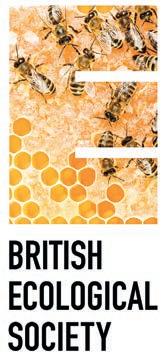
29 29
SENDING OUT AN SOS FOR THE OWLS
[ESTABLISHED IN 2001, the Suffolk Owl Sanctuary – known, appropriately, as S.O.S. – operates a comprehensive facility for the rescue, care and rehabilitation of owls across East Anglia. It also promotes the need for the conservation of endangered owl species throughout the UK with its Saving Britain's Owls initiative.

The S.O.S. owl and raptor hospital at Stonham Aspal is unique in the region.
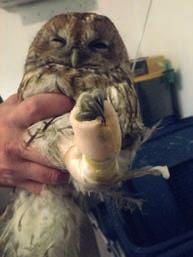
It is specially equipped for the care and treatment of the many injured wild owls and other birds of prey it receives every year as a result of road traffic accidents, mishaps, starvation, trauma, disease, poisoning and sometimes even shooting or trapping.
Many of the birds can be given a recuperative, short-term pick-me-up before being re-released into the wild. Those that are more seriously injured but stand a chance of recovery are given medical aid and/or surgery, as determined by their vet. The birds are then allowed space and time to fully recuperate in one of the secluded recovery aviaries, before being carefully returned to the wild.
S.O.S. is regenerating its wild owl nest box scheme that includes building, locating and curating long-lasting, environmentally-friendly nest boxes in appropriate locations to replace the gradual erosion of natural nesting sites.
S.O.S. is funded purely by donations, and as a small charity the legacies it receives play an important role in enabling it to continue developing its resources in the interests of conserving owl and other bird of prey wildlife in the UK. q
IF YOU WILL, WE WILL
[LEGACIES MEAN SO much to the team at Last Chance Animal Rescue. These wonderful gifts have helped them to rescue, rehabilitate and re-home so many abandoned, abused and unwanted dogs, puppies, cats, kittens, rabbits and guinea pigs who otherwise would have had no future.
The charity understand the wishes of its kind benefactors who have considered them in their Wills. A spokesperson said: “We know they want their generous gift to us to be used directly to save lives, provide the very best of care and to find loving homes.
“Legacies really do provide the gift of life and Last Chance Animal Rescue can now, after much planning and prudent use of funds, offer our life saving services to so many more needy pets. We are delighted to announce we now have a second rescue and rehoming centre in Kent, giving hope and a true last chance to so many.


“Sadly we cannot thank those who have enabled this wonderful achievement but are extremely grateful to all those who are currently considering helping us now and in the future to continue our work.” q

30 30
A new friend for Alan
CHARITIES ACT: MORE PROVISIONS DUE IN JUNE
THE CHARITY COMMISSION has published short summaries of the changes to charity law due to come into effect in June as a result of the Charities Act 2022. The changes were originally planned for implementation in the spring but have been delayed.
Selling, leasing or otherwise disposing of charity land
Charities must comply with certain legal requirements before they dispose of charity land. Disposal can include selling, transferring or leasing charity land. The Act will simplify some of these legal requirements. The changes will include:
• Widening the category of designated
• advisers who can provide charities with
• advice on certain disposals

• Confirming that a trustee, officer or
• employee can provide advice on
• a disposal if they meet the relevant
• requirements
• Giving trustees discretion to decide how to
• advertise a proposed disposal of charity land
• Removing the requirement for charities
• to get Commission authority to grant a
• residential lease to a charity employee for
• a short periodic or fixed-term tenancy
Other provisions are expected to come into force by the end of the year, not in June.
They are:
• The provisions relating to disposals by
• liquidators, provisional liquidators,
• receivers, mortgagees or administrators
• The provisions relating to the taking out
• of mortgages by liquidators, provisional
• liquidators, receivers, mortgagees or
• administrators
• Changes about what must be included in
• statements and certificates for both
• disposals and mortgages
Using permanent endowment
Permanent endowment is property that a charity must keep rather than spend. The Act will introduce new statutory powers to enable:
• Charities to spend, in certain
• circumstances, from a ‘smaller value’
• permanent endowment fund of £25,000 or
• less without the Commission’s authority
• Certain charities to borrow up to 25% of
• the value of their permanent endowment
• fund without the Commission’s authority.
Charities that cannot use the statutory powers will require Charity Commission authority.
A new statutory power will enable charities that have opted into a total return approach to investment to use permanent endowment to make social investments with a negative or
uncertain financial return, provided any losses are offset by other gains.
Charity names
The Commission can currently direct a charity to change its name if it is too similar to another charity’s name or is offensive or misleading. The new Act will enable the Commission to:
• Direct a charity to stop using a working
• name if it is too similar to another charity’s
• name or is offensive or misleading. A
• working name is any name used to identify
• a charity and under which the activities
• of the charity are carried out: for example,
• Comic Relief is the working name of the
• charity Charity Projects.
• Delay registration of a charity with an
• unsuitable name or delay entry of a new
• unsuitable name onto the Register of
• Charities
• Use its powers in relation to exempt charities
• in consultation with the principal regulator
Other provisions
The definition of a ‘connected person’ will be updated to remove outdated language.
The Charity Commission has undertaken to publish the updated guidance on those topics on the day the provisions are implemented. q
THIS SANCTUARY HELPS DONKEYS FROM BRITAIN, EUROPE AND BEYOND

ESTABLISHED IN 1990, NEDDI has offered care and safety to donkeys – and to a lesser degree, ponies – in Britain and Europe who have suffered neglect, cruelty or maltreatment or who are at risk of such treatment.
In addition to rescuing such animals from undesirable situations, within the financial and practical constraints prevailing at the time, they have worked to try to change attitudes and to educate donkey owners into better practices.
Since 2016 they have been assisting associates in Kenya to achieve those aims for the working animals there and NEDDI will now be concentrating on this work, including supporting the operation of road-side clinics.
Since its establishment in Cornwall, NEDDI has operated a sanctuary specifically for distressed donkeys. In 2001 the sanctuary moved to just the other side of the channel, where the resident donkeys enjoyed more space and pasture than would otherwise have been possible. In 2023 the donkeys in NEDDI’s care moved to a long established sanctuary near Clermont Ferrand, in central France, for their continued hands-on care.
NEDDI is a comparatively small organisation with limited resources, and relies heavily on support from animal lovers. A bequest will enable more donkeys to be freed from pain and misery. q
31 31 [
[


32 32
SCOTTISH CHARITY BILL CLEARS FIRST HURDLE
[MEMBERS OF THE Scottish Parliament have voted unanimously to support the general principles of the Charities (Regulation and Administration) (Scotland) Bill at Stage 1 of its passage through the Parliamentary process. The Bill seeks to improve the accountability and transparency of charities and increase the powers of the Scottish Charity Regulator (OSCR).

Social Justice Secretary Shirley-Anne Somerville commented: “Our focus is to ensure the best possible conditions for the sector, which plays a vital role in our society, to thrive. Current charity law is now over 17 years old and the sector has changed significantly in that time. That is why we want to strengthen, modernise and improve charity regulation to ensure it meets the needs of charities.
“Scottish charities have a combined income of £14bn each year, so it’s crucial the way they are regulated remains fit for purpose. Charities are widely supported by the public. Trust in them and what they deliver is high, and we want to keep it that way.”
The Charities (Regulation and Administration) (Scotland) Bill is a commitment in the Scottish Government’s 2022-23 Programme for Government.
Its provisions include:
• Updating the criteria for the automatic disqualification of charity
• trustees and extending it to individuals with specific senior
• management positions in charities
REGULATOR PUBLISHES LATEST DATA ON SCOTTISH CHARITIES
[ ON 2 MAY the Scottish Charity Regulator (OSCR) published its latest Sector Overview Report, covering the period up to 31 March. The report uses key facts and figures from its database of charity information to present a profile of income, expenditure, purposes, beneficiaries, activities and operations.
The figures show that the gross annual income of charities on the Scottish Charity Register is £14bn. However, the majority of charities (57%) report annual incomes of up to £25,000.
It is estimated that there are 180,000 trustees of charities on the Scottish Charity Register, with charities having seven on average, and they employ 209,601 people as paid staff; however, around two thirds of charities employ no paid staff and are run entirely by volunteers, including the charity trustees.
Previously, the report was published as a document every two years, with the last publication in 2021. However, as part of a commitment in OSCR’s Corporate Plan to promote and improve transparency, the Sector Overview Report has been moved to an online platform where it will be updated quarterly from now on.
OSCR’s chief executive Maureen Mallon said: “Knowing the scale and scope of the charity sector – and what issues are challenging charities in Scotland – helps inform the decision making of OSCR, governments and other stakeholders.
“The report is a great resource for anyone seeking general information about the Scottish charity sector. In time the data will also help us understand the impacts of the COVID-19 pandemic and the cost crisis on charities and how charities adapt. The new dynamic format of our Sector Overview Report allows us to share this vital information more frequently and automates some of our internal processes so our resources can be used in other ways.” q
• Removal from the Scottish Charity Register of unresponsive
• charities that fail to submit statements of account
• A requirement for all charities in the Scottish Charity Register to
• have and retain a connection to Scotland
• A requirement on OSCR to publish the statements of account for all
• charities in the Scottish Charity Register
• Requirements on OSCR to include charity trustee names in the
• Scottish Charity Register, to keep an internal schedule of charity
• trustees’ details and to create a publicly searchable record of charity

• trustees removed by the courts
The Scottish Government consulted on proposals put forward by OSCR in 2019. It consulted again on a number of specific reforms in 2021 and found a majority in favour of the changes. q
33 33

OESOPHAGEAL CANCER – COULD YOU SPOT THE WARNING SIGNS?
[ DID YOU KNOW that only 2% of people can correctly identify the main oesophageal cancer symptoms?
Despite being one of the least survivable cancers - awareness of symptoms is dangerously low for this killer and early diagnosis is key for the best chance of survival.
But what to look out for?
• Excessive heartburn or indigestion for
• three weeks or more
• Difficulty or pain in swallowing food
• Persistent hiccups and/or ongoing
• weight loss
The best advice is to take action and see your GP for reassurance or treatment.
Heartburn Cancer UK


Heartburn Cancer UK was set up by Mimi McCord in 2003, following the tragic death of her husband Michael from oesophageal cancer.

Michael died in 2002 at just 47 years old. He had been experiencing heartburn for a number of years and antacids had been a regular item in the family shopping basket each week. It was only when he was struggling to swallow his toast one Saturday morning that Mimi suggested he speak with their doctor. He was referred to a gastroenterologist, sent for an endoscopy and diagnosed with cancer. Michael died at home just nine weeks later.
His devastating and untimely death, like many others, may have been prevented if he had known about the dangers of persistent heartburn and its link to oesophageal cancer.
The seemingly harmless symptom is often treated with over-the-counter remedies because people are unaware of the risks. The charity’s mission is to raise public awareness of the dangers of ignoring persistent heartburn and to urge people to seek advice from their GP. If your heartburn is persistent and happens most days for three weeks or more, Heartburn Cancer UK says, you should get it checked.
They also provide information and support to patients and their families living with reflux, Barrett’s oesophagus (a precancerous condition) and oesophageal cancer, and support research to help increase early diagnosis, improve patient outcomes and ultimately help save lives.

to as many people as we can and raising awareness as we go.”
Awareness and support
Around 8,000 people die in the UK every year from oesophageal cancer – that’s 22 deaths every day. It is the seventh biggest cancer killer, with an appalling prognosis of only 15% of patients surviving for five years.
Early diagnosis
Oesophageal cancer is the fourth most common cause of cancer death in males. Currently, 70% of cases are discovered too late for curative treatment with the most common early symptom being persistent heartburn: Heartburn Cancer UK hopes to be able to change that with the help of its supporters.
Mimi told us: “The key to challenging these appalling stats is early diagnosis. Excitingly, we are currently partnered in a pilot project which introduces an innovative screening test, the CytospongeTM, into primary care: initially in East Anglia, Essex and Suffolk where the project will screen 1,500 at-risk patients with the use of a mobile diagnostic unit supplied by Heartburn Cancer UK.
“The CytospongeTM test is 50% less costly than the current hospital-based alternative, the endoscopy, and has been shown to identify 10 times as many cases of concern as current primary routine care. It is our aim to help introduce a wider screening service, in a variety of geographical areas, bringing access to this potentially life-saving test
Your support
Heartburn Cancer UK are delighted to be celebrating 20 years as a charity in 2023, with Mimi just as passionate about raising awareness and helping to save lives today as she was 20 years ago.
Donations from supporters are more important than ever to help continue their vital work and there are lots of ways people can make a difference.
Said Mimi: “Help us celebrate our 20 years as a charity in 2023 and participate in a challenge – maybe something that’s been on your bucket list for a while – and you can help raise funds for us at the same time. Consider a donation, setting up a regular payment to us or a legacy gift. You could even do something as simple as select us as your charity on Amazon or Easy-Fundraising and every time you shop you could help support us by just buying something and not spending a penny more.”
No matter how large or small, said Mimi, every penny can help make a difference.
She added: “After 20 years of seeing no change in earlier diagnosis, the CytospongeTM could really make a difference and we want to continue to support its journey into everyday care in any way we can. Along with vital awareness about not ignoring persistent heartburn problems that trouble you regularly, we are determined to continue making a difference and help save lives.
“If you have persistent heartburn, getting checked by your doctor will help give you peace of mind or put you on the path to a far better prognosis if there is a problem.” q
• For more information about the charity, or how to donate, visit the website at www.heartburncanceruk.org
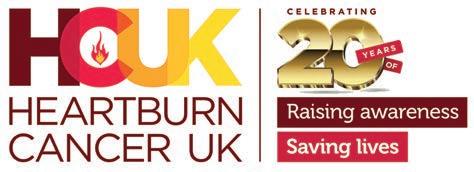
35 35
THEY RESCUE ANIMALS –AT HOME AND ABROAD
[MAYBE YOU LOVE ANIMALS: maybe you have given a loving home to dogs or cats in need. Perhaps the suffering of animals through neglect, abuse or abandonment causes you pain. If you would like to help create a world that is kinder to all creatures, remembering Paws2Rescue in your will means you will help to alleviate the suffering of animals for years to come.
The mission Of Paws2Rescue is simple: to help animals in need wherever they are. As they are entirely staffed by volunteers, every penny they raise enables them to fulfil that mission over and over again.

Paws2Rescue’s Alison Standbridge explained: “Although we are a UK- based charity, we recognise that too many animals overseas suffer appalling neglect and cruelty. That’s why, as well as finding loving UK homes for unwanted dogs and cats, we undertake a variety of international projects to reduce the suffering of animals, with a particular focus on Romania and Moldova –countries where animals continue to suffer the most distressing abuses.
“We aim to alleviate the day-to-day misery of these unfortunate animals by meeting their basic needs – food, medical treatment and sanctuary – and by supporting shelters in rural areas where resources are desperately needed.”
But the key to truly ending the misery is to tackle its root causes. Therefore, Paws2Rescue also provide free neutering services for both stray and owned animals, encouraging owners to take responsibility for their pets’ health by preventing unwanted litters of kittens and puppies. Their Veterinary Scholarship Programme funds young people through their university studies to encourage more local vets to work in rural areas in Romania where the need is greatest. Alison continued: “Education is crucial to our mission: if future generations are brought up to hold the same antiquated, cruel attitudes towards animals as many of their elders, then the horrible abuses will continue. To break this negative cycle, our successful schools
Bobi before and after being rescued programme uses purpose-made educational materials to foster compassion, teaching children to love and respect all living things.

“So, although our current aim may be to help animals in need wherever they are, our dream is to create a world where no more animals need our help.
“By leaving a legacy to Paws2Rescue, no matter how small, you can rest assured every penny of your kind donation will be helping dogs, cats and other animals in desperate circumstances both now and in the future. Thank you.” q
36 36
FEWER PEOPLE PARTICIPATE IN CHARITABLE ACTIVITIES, CAF FINDS
[RESEARCH PUBLISHED by the Charities Aid Foundation
(CAF) has revealed that fewer people are donating, volunteering and sponsoring charities than was the case before the pandemic. It suggests a worrying and possibly permanent change in charitable activity, CAF believes.
The long-running UK Giving Report contains survey data about the giving landscape for the whole of 2022. It covers the UK public’s generosity in response to the invasion of Ukraine, followed by the implications of the cost-of-living crisis at home.
Although participation in charitable and civic activities in 2022 was similar to 2021, it is still well below pre-pandemic levels. Throughout the year, only 7% report volunteering for a charity in the previous four weeks, down from 9% in 2019. Additionally, only 13% say they volunteered in the past year, compared to 17% pre-pandemic. That represents around 1.6 million fewer people volunteering over the past five years.
The cost-of-living crisis has also had a marked impact on charitable giving. Over the year more than two thirds (69%) of people said they would need to make cuts to their spending to help manage bills –including 17% who said they would be likely to cut their charitable donations. A quarter (24%) of people reported changing their charitable behaviour, including reducing or cancelling a regular charity donation (5%) and choosing not to make a one-off donation (10%).
Compared to the same months in 2021, March and April were the only months of 2022 when giving spiked – to 34% and 28% respectively
CONCERN FOR WORKING HORSES’ WELFARE LEADS TO CHARITY’S CAMPAIGNING ROLE
[THE HORSE RESCUE FUND was founded at a time when many deliveries were still being carried out using horses – which at that time were destined for a bleak fate after they finished their working life.
That history explains why, as well as rescuing horses, ponies and donkeys in desperate need, the fund has campaigned for improvements at horse sales, in transit and for equine welfare generally. Indeed, they often work in conjunction with their fellow organisations on some of the largest equine welfare cases.
The charity’s byline is: Rescue, Rehabilitate, Rehome
A spokesperson for the charity commented: “All of our rescued horses are treated as individuals and – being one of the smaller welfare charities – our staff get to know the likes, dislikes and foibles of each horse in our care, so their treatment can be personally tailored to their needs.”
After rehabilitation and when they are fit, their animals are placed on loan in private adoptive homes to lead happy, useful lives. Some have gone on to win at prestigious shows, and even appeared on television!
They continued: “We never sell them, so we are able to ensure their wellbeing for the rest of their lives; and if their loaners’ circumstances change, they can always be returned to us. Horses do so much for humans – we try to repay some of that debt; they cannot speak, but we can.”
Funds are urgently needed to continue that work: legacies, covenants, individual donations or corporate funding are all most welcome. Supporters receive a biannual newsletter keeping them up to date with all the happenings on the yard at Woodstock Farm in Norfolk.
For more information visit the website at www.horserescuefund.org.uk or email info@horserescuefund.org.uk q

– seemingly in reaction to the invasion of Ukraine. In March 2022, the average donation increased to £85 and remained high at £64 in April.
That contributed to an estimated £12.7bn donated to charities in 2022: an increase of £2bn compared to 2021. The increase in the overall amount given in 2022 is a result of people donating higher amounts, rather than an increase in the number of people giving. However, due to rising inflation, analysis from Pro Bono Economics suggests that may have been eroded by as much as £0.5bn.
Neil Heslop OBE, chief executive of the Charities Aid Foundation, said: “It is worrying that we continue to see a declining number of people donating to charity, alongside the drop in participation in fundraising events and volunteering due to COVID lockdowns, which now appear to be locked in.
“While the government’s lifelines for charities this year may have been make or break for many, these findings show the next task is to come up with the policy solutions and incentives required to foster a more widespread culture of giving and participation in the UK.”
Jansev Jemal, research and policy director at Pro Bono Economics, added: “Charities have experienced a protracted period of difficulty since the outset of the pandemic. While managing a truly challenging triple threat of rising costs, income worries and spiralling demand, they continue to play their critical role supporting communities, providing services and campaigning for change. It’s important that policymakers consider how they can support charities to raise more funds and to invest in the improvements they need.” q
37 37


38 38
MAJOR CAMPAIGNERS LEAD TO RISE IN DONATIONS FOR 2022
[FIGURES FROM BLACKBAUD UK, the cloud-based computing provider for charities, show that income for UK charities is trending up, with overall giving up 4.2% in 2022. The figure is based on fundraising data gathered from Blackbaud customers.

The company’s UK Giving Focus draws on information from a cross section of experts ranging from Dan Fluskey, director of policy and communications at the Chartered Institute of Fundraising, to Pascale Harvie, senior vice president at JustGiving.
In his foreword to the document, Dan Fluskey writes: “As we look ahead to 2023 (and beyond) there are many reasons to tread with caution as we move forward. The cost of living and economic situation will always dominate the big picture for us – charitable giving does not happen in a bubble.
“But I also believe that it doesn’t definitively predetermine how fundraising will perform. The choices made on strategic investment in our fundraising teams, capacity and skills are likely to have a much more significant impact on performance over time, and the importance of organisations giving fundraisers the same
professional respect, recognition and support should not be underestimated.”
The crisis in Ukraine was a key driver in the first quarter of 2022, with almost one million donations made towards Ukraine-related causes, bringing in over £60m of support. Those contributions led to a 4% increase in fundraising compared to the first quarter of 2021.
The increase in donations is in contrast to the fall in the number of people who were involved in charity work, as a small number of people were seen to make massive impacts on giving.
The report says: “Compared to Q2 of 2021, the second quarter of 2022 saw a tremendous increase of 20% through the inspirational Bowelbabe fundraiser. This campaign, led by Dame Deborah James in her battle with cancer, raised over £8m for Cancer Research UK.
“This fundraiser, benefitting clinical trials and research into personalised medicine for cancer patients and supporting campaigns to raise awareness of bowel cancer, is the second largest page ever after Captain Sir Tom Moore’s landmark 2020 fundraiser.”
Pascale Harvie summed up the picture: “Across the board, generosity prevailed in 2022,
A SMALL CHARITY WITH A HUGE HEART
KIDNEY KIDS SCOTLAND, a very small charity with a huge heart, has for the last 23 years supported Scottish children with renal and urology conditions. The main aim of the charity has always been to enable these children to receive treatment as close to home as possible and minimise disruption to the family unit.
In addition the charity helps hospitals all over Scotland, supplying them with much needed equipment and funding posts recognised as being essential. Chronic Kidney disease is a condition that has no cure and that children and their families must learn to live with.

IMAGINE your child only being able to drink 400mls in one day. That’s less than two cartons of juice – a can of juice is 500mls.
IMAGINE being a parent where you must be home before 8pm every single night to ensure your child gets their daily home dialysis.
IMAGINE not being able to take your family abroad or too far away from the hospital because your child cannot go without their dialysis. This HAS to happen in hospital 3 or 4 times EVERY week.
IMAGINE your child missing out on school education, social activities, family members’ birthday celebrations, a sibling’s sports day or a family wedding because you need to make sure they receive their life saving dialysis treatment.
IMAGINE your child spending their birthday and/or Christmas Day in hospital and not being able to see their friends from week to week. q
IMAGINE LIVING WITH KIDNEY DISEASE
For more information about Kidney Kids Scotland please visit our website at www.kidneykids.org.uk, call 01324 555843 or email office@kidneykids.org.uk
Kidney Kids Scotland can help in many ways
with 17.3 million donors supporting over 20,300 causes in this year alone. Fundraisers used their voices and talents for advocacy, with highly personal causes and creative approaches resonating with millions of donors. Events like the London Marathon brought together more than 40,000 runners and reached new heights of fundraising. Historic events impacted giving in a multitude of ways, from the efforts to support those affected by the conflict in Ukraine to the time of mourning observed following the passing of The Queen.
“Ultimately, the success and resiliency of personally-organised fundraisers teaches organisations the value of capturing moments of inspiration to make the greatest impact, even in uncertain times.” q
39 39 [
BROTHERLY LOVE...
[INTRODUCING chimpanzee brothers Fergus and Twmi – they are the reason Wales Ape & Monkey Sanctuary began back in 1998.





Even though they are brothers, their personalities are quite different!
Fergus (36) is very mischievous and loves the camera – and apart from hoarding bananas and eating onions, winding the other chimps up, he loves to be in every single photo you try to take.
Twmi (38) is more cool, calm and collected. He likes to oversee and watch what the other chimps are getting up to but also makes his presence known if needed. He loves head bopping to Queen – his favourite band –

and loves his food. Iceberg lettuce and grapes are a firm favourite.
Fergus and Twmi have a great relationship with Nakima, Bili and Ronnie, the other chimps they live with. You will see them on sunny days relaxing in their hammocks and grooming each other.
The brothers are both very popular amongst visitors. Children often get smiles from Fergus which makes their day! q
• For more info call 01639 730276, email info@ape-monkey-rescue.org.uk or visit the website at www.ape-monkey-rescue.org.uk

40 40
TWMI FERGUS
TRUST WORKS TO SAVE ICONIC WORKING HORSES

THE SUFFOLK PUNCH TRUST is a registered charity, whose aim is to ensure the survival of the famous horse breed. It was founded in 2002 to save the historic Hollesley Bay Colony Stud.

That stud brought a rich legacy of equine and agricultural history which deserves to be saved for future generations to enjoy. The trust aims to achieve that through a successful breeding programme, supported by funding, education and the outreach facility of its visitor centre.
The Suffolk Punch is the oldest English breed of working horse, dating from the 16th century. Every Suffolk horse can be traced back to a stallion, known as Crisp’s Horse of Ufford, foaled in 1768. The Suffolk horse was developed for farm work and gained popularity during the early 20th century. As agriculture became mechanised, however, the numbers fell and the breed almost disappeared completely.
The aim of the trust is to help save the iconic breed from extinction through its established breeding programme. It is working towards increasing the numbers of horses through normal breeding processes and an artificial insemination programme.
It also works to raise public awareness and is training a new generation of professionals to work with and understand the needs of the breed. The Suffolk Punch is incredibly versatile and is now often employed in forestry and ridden work.
The Suffolk Punch Trust can only continue its work with the help of donations and legacies. As David Clarke, one of the trust’s directors, explained: “Your legacy, large or small, will make a huge difference to the work we carry out, enabling us to care for our horses and continue the breeding programme to secure this wonderful breed.” q
HEARTBEAT HORSES HAPPY IN THEIR NEW HOME
THE HEARTBEAT HORSES now live in a new home at Sink Farm in Woodbridge, Suffolk and are cared for alongside the wonderful Suffolk Punch horses.
Sink Farm is the colony stud for the Suffolk Punch Trust charity, who continue their important and essential work in preserving this unique breed. q
• For more information on either charity please contact Tracey Pettitt, stud manager or David Clarke, finance director, on 07768 025128. Heartbeat Homes for Horses, Sink Farm, St David’s Lane, Hollesley, Woodbridge, Suffolk IP12 3JR
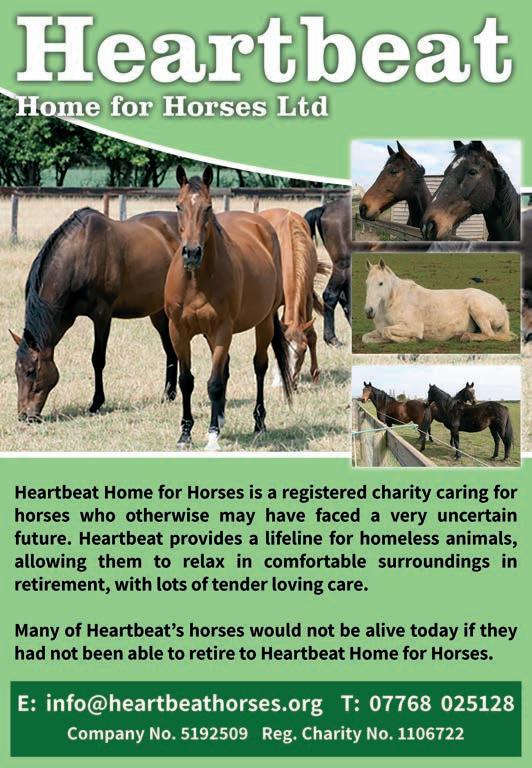
41 41 [
[
GIVING HORSES AND PONIES THE LIFE THEY DESERVE
[ FFOREST UCHAF HORSE & PONY CENTRE – aka The Pit Pony Sanctuary – are a small group of volunteers in Wales who help all the needy horses and ponies they can with meagre resources.


“We have been a charity since 1991, but our team has been doing this work since the 1960’s,” explained the charity’s founder Roy Peckham.
“We found pit ponies still at work in the small private mines in Wales and became their salvation by creating The Pit Pony Sanctuary
“Over the years we have taken in numerous needy horses and ponies, including some old pit ponies. Our only surviving pit pony ‘Spike’ toiled in several small mines in the Swansea Valley. Although elderly, and needing tender loving care, he is in good health now and enjoying his life at the centre.

“Help us make success stories like Spike’s. Our donors change lives, and you can, too!” q
• For further information visit www.pitponies.co.uk
ANOTHER MONTH FACING A £40,000 VET BILL
[OVER THE LAST FEW MONTHS Hope Rescue in South Wales have consistently faced extraordinarily high vet bills due to the number of very poorly dogs entering their care, many of which require ongoing investigations, treatments and surgeries.

Unfortunately, this is a pattern likely to continue and the charity’s outgoings are set to rise due to the constant influx of abandoned and stray dogs coming through their doors – as well as trying their hardest to help owners who can no longer care for their dogs. Not to mention the increasingly high numbers of dogs seized from illegal and low welfare breeders.
Hope’s initial fundraising appeals often only cover a fraction of the total costs incurred in nursing dogs through
to recovery. Ensuring each individual dog gets the very best vet treatment – which is often not the cheapest option – will always remain a priority for the team at Hope.
Supporting this charity through promoting gifts in wills will help them to plan and will be
the reason they can continue to say ‘yes’ to vulnerable dogs and their owners. q
• Find out more about Hope Rescue at www.hoperescue.org.uk or get in touch enquiries@hoperescue.org.uk

42 42
RESCUE CENTRE OFFERS A LIFELINE TO INJURED WILDLIFE FUNDRAISING COMMUNITY LOOKS FORWARD TO ITS BIG EVENT
[THIS YEAR’S Fundraising Convention will be taking place on 3-4 July, both in-person at the QEII Conference Centre and as a virtual event.
Organised by the Chartered Institute of Fundraising (CIoF), Fundraising Convention is the largest in-person event for fundraising professionals in the UK, and the one time of year when the sector meets to feel part of a community.

This year’s theme is Connection. It will provide a space to imagine what could be possible; a place to be inspired, discover the latest trends, learn best practices and network with others who understand the challenges and opportunities that a job in fundraising brings. It is a learning opportunity not to be missed.
The in-person ticket allows entry to the QEII Centre and access to in-person networking and content from six learning tracks. It includes:
• Attendance at the plenary session, including keynote speaker
• presentation
• Live interaction during a free choice of track sessions around the
• building
• A mix of in-person fringe activities within and outside the building
• Sponsor insight sessions and access to the multi-stand Expo arena
• Involvement in a community outreach initiative supporting a local
• small charity
• Refreshments and lunch
• Post-event resources from speakers featured during the day In-person delegates attending on 3 July are cordially invited to join peers at an evening reception celebrating the 40th anniversary of the Chartered Institute of Fundraising. A reduced-price virtual ticket is also available for those who cannot attend in person.
Paul Laird, the CIoF’s director of learning and volunteering, said in a blog: “Attending my first Convention last year introduced me to new expressions of the warmth, openness and determination of this community, so it's a joy to be involved in shaping Convention 2023. It's clearer than ever that many fundraisers love to connect with each other and value the sense of belonging this brings. It's what drives our excellent Convention Board volunteers and our passionate staff team to deliver a first-class experience for everyone attending.
“I can’t tell you how much I’m looking forward to meeting both inperson and virtual delegates. Staying connected, having each other’s backs, and focusing on the future are drivers that have never been more important. Fundraising Convention will showcase talent, inspire and motivate, and further build community. I hope to see you there.”
For more information and to book places at both the in-person and virtual events, visit oif.org.uk/events-and-training/convention/2023 q
[HESSILHEAD WILDLIFE RESCUE TRUST is situated near Beith, in North Ayrshire. It was set up as a charity in 1986, although its founders Andy and Gay had been caring for injured and orphaned wildlife since 1970, when they rescued a fox cub from a gamekeeper and his dogs. As the number of casualties increased year on year, Andy and Gay needed financial and practical help.

Once the trust was set up, new aviaries and enclosures were built. A membership scheme proved popular and many volunteers were recruited. The centre now occupies a 20-acre site, including woodland, marsh and open water. That gives a variety of release sites for its patients.

Approximately 3,500 wildlife casualties are now treated each year, with the aim of returning them to the wild. Among the many hedgehogs, foxes and familiar garden birds there are deer, otters, badgers and seals. All have been rescued and are rehabilitated. In addition, swans are treated regularly, along with buzzards, peregrines, herons and sea birds.
The centre operates a 24-hour rescue service and there are more than 60 enclosures and aviaries, a hedgehog hospital, a seal/swan unit and intensive care facility. It also offers training courses on the handling, care and treatment of wildlife casualties.
Spring and summer are especially busy, with hundreds of nestling birds being hand reared. Care is taken to rear all youngsters with minimum human contact. That prevents wild birds and mammals becoming too used to people, so giving them a good chance of survival in the wild.
Hessilhead is primarily a voluntary organisation. Its volunteers help in many ways: fundraising, building and maintenance, driving patients to the centre and daily cleaning and feeding. q
43 43

THEIR PROJECT IS TO REINTRODUCE FOXES TO THE WILD

[IT WOULD BE TEMPTING to try to explain all that is The Fox Project, but that would look a little like a shopping list: wildlife information bureau, humane fox deterrence consultancy, wildlife ambulance service, wildlife hospital etc.
Instead, it would be more straightforward to concerntrate on what’s going on right now, as we enter the annual UK red fox breeding season, with an expectation of anything up to 300 sick, injured and orphaned fox cubs being receieved by the Fox Project. How does that work?
Wynn was one of the first cubs the project received in 2021. He is pictured gazing thoughtfully out of his pen at the setting sun, perhaps quietly wondering how he can get out into the big, wide world and do what he wants, rather than what we want.
Founder of The Fox Project Trevor Williams takes up the story: “Wynn was picked up next to a dead sibling by a passing dog walker and we assumed they had crawled out of the den in search of a mother that, for whatever reason, had failed to return. He was a keen bottle feeder, and because baby animals need the company and warmth of others, he was grouped with Wendell, Wilfred, Calvin and Bertie.
“Cubs grow fast and a brooder will only hold them for so long before their accommodation needs to be upgraded to steel vet cages. And they, too, are soon inadequate for curious, active youngsters who are developing speed and agility – albeit wobbly speed and agility!
“The next step was day release in a two-storey chicken run and back in the warm at night for a bedtime bottle and a bowl of dog food. They loved that! And then they were moved to a larger foster pen, where muscles could develop and they could feel the weather.
“As soon as Wynn and Co were weaned off the bottle, the bond with their feeder was broken and they were transferred to one of our team of fosterers. These volunteers have pens in their gardens where they can look after the needs of a litter of cubs without getting directly involved with them.
“And that is where the serious work begins in encouraging cubs to revert to wild in preparation for late summer release. Given all the changes, our cubs should be growing suspicious of people in general; and their first instinct when a fosterer approaches is to run into the hutch provided. If they begin to get ‘waggy’ with the fosterer, we move them to another. And we keep doing that right through the summer.
“From mid-June, we start to move them onto pre-arranged rehab sites – no more than five cubs per site. Those are predominantly rural: often farms and smallholdings.”
The cubs are now the responsibility of the rehabber that owns the property. Their job is to feed, water and clean out the pen and never to speak. A cautious cub is a cub that will live the longest: if you’ve made a cub tame, you’ve undermined their potential for a safe and long life.
After four to six weeks on site the cubs are used to the sights, sounds and smells of every other animal in the area and vice versa. That means they can safely be released without danger of attack. Come the night of release, the rehabber simply leaves the door open and walks away.
Trevor continued: “Timing for this final part of the procedure is governed by nature. Just as the breeding season fluctuates a little every year, so does natural dispersal, when wild-raised cubs – by now around five months old – will fan out from their home territory to locate their own: a vital process to avoid in-breeding and necessary if they’re ultimately to find a mate. Release of our cubs is timed to coincide with that point.”
Wynn and his chums were released from a smallholding in East Sussex. Initially, they all returned for support feeding, but it’s seldom needed for long. As they begin to use the instincts nature provided them with, the cubs return less and less frequently.
“When they no longer return,” said Trevor, “we must hope they’re doing well. And we generally know they are, because we often see them around for months, or even years. Not that it’s any of our business. We’ve given them that all-important second chance and whatever befalls them, good or bad, is down to them.” q
45 45
REPEATED INQUIRIES INTO CHARITY PROMPTS STATEMENTS FROM REGULATORS
THE CHARITY COMMISSION issued a statement following the conclusion of its second inquiry into the charity Hospice Aid UK. The inquiry led to a conclusion of serious misconduct and/or mismanagement.

Hospice Aid UK was founded in 2002 with aims that included facilitating and promoting the relief, care and treatment of the sick, especially of the dying, and the support and care of their families and carers and of the bereaved.
As part of the second inquiry the regulator issued the charity with an Official Warning after finding misconduct and/ or mismanagement by its trustees. That included trustees’ failure to fully comply with a previous action plan – issued in 2016, following the first inquiry – which had required them to significantly increase the proportion of the charity’s income spent on supporting hospices.
The Commission found that the substantial funds generated were consumed almost entirely by the direct costs and fees of running the fundraising activity. Between March 2013 and July 2020 the charity raised over £3.2m, but the direct costs and fees of that fundraising came to just over £3m – leaving less than 6% for charitable activities.
A review of the charity’s 2018 accounts found that the trustees had renewed a costly direct mailing agreement with a
specialist direct marketing and fundraising agency, despite the Charity Commission’s earlier findings that this was not an effective use of charitable funds.
Amy Spiller, head of investigations at the Charity Commission, said: “The public expects trustees to ensure that the money they donate goes towards delivering the charity’s objectives and is carefully managed in the best interests of the charity. In this case, a woefully small proportion of funds generously donated by the public in support of hospices reached the intended cause. This was a direct result of the trustees’ misconduct and mismanagement.
“Cases like this risk seriously undermining public trust and confidence as well as people’s willingness to donate to the thousands of well-run charities doing great work across the country.”
The case prompted Catherine Orr, head of casework at the Fundraising Regulator, to issue a statement on the implications of using third-party agencies and possible effects on donor confidence.
She wrote: “We have followed this inquiry closely and have serious concerns about the agreement described between the charity and third-party agency. Now that the statutory inquiry has concluded, we will consider any appropriate action for the Fundraising Regulator to take.
“I don’t think that what happened in this case would align with the reasonable
expectations of donors giving to the cause. This case highlights important issues for the wider sector to consider when working with third parties to fundraise.
“Trustees are ultimately responsible for their charity’s fundraising activities and must act in the charity’s best interest, including when making agreements with third parties. Trustees must also take reasonable steps to assess and manage any risks. If donors are not given a fair indication of the costs involved in fundraising, this may pose a reputational risk and impact more widely on public trust and confidence.
“As a regulator, we would generally expect that the greater portion of money raised through these arrangements is transferred to the charity, with the understanding that a third party can cover legitimate costs and generate reasonable profit.
“We expect charities and third-party fundraisers to take all reasonable steps so donors can make an informed decision to donate. Some of these steps will be informed by the law, and some by best practice. Charities should be open and honest about how fundraising by third parties will be of benefit to them. This could include sharing relevant information in annual reports or checking solicitation statements are used appropriately and are designed to protect donors through being sufficiently transparent.” q
RE-HOMING IS THEIR MISSION
[THE MISSION of Three Counties Dog Rescue is to accept, care for and find homes for unwanted, lost and stray dogs and cats and to ensure their wellbeing afterwards. The charity was founded in 1971 and since then they have improved the lives of over 7,600 dogs and cats.
Before rehoming, all animals are vet checked, neutered, vaccinated, microchipped and kept in suitable conditions. Rehabilitation costs are a major part of the charity’s annual expenditure of over £200,000. Healthy animals are never put down. As part of that non-destruction policy, several elderly dogs are kept in long term foster care. However, this means that the charity can incur large veterinary costs to maintain a dog’s health while they await a new permanent home. They now provide boarding and cremation services with profits supporting the Rescue. Every penny raised goes to improving the lives of dogs and cats. Three Counties Dog Rescue is run entirely by voluntary and unpaid helpers, who also meet their own expenses. q

46 46
[



47 47

































































































































